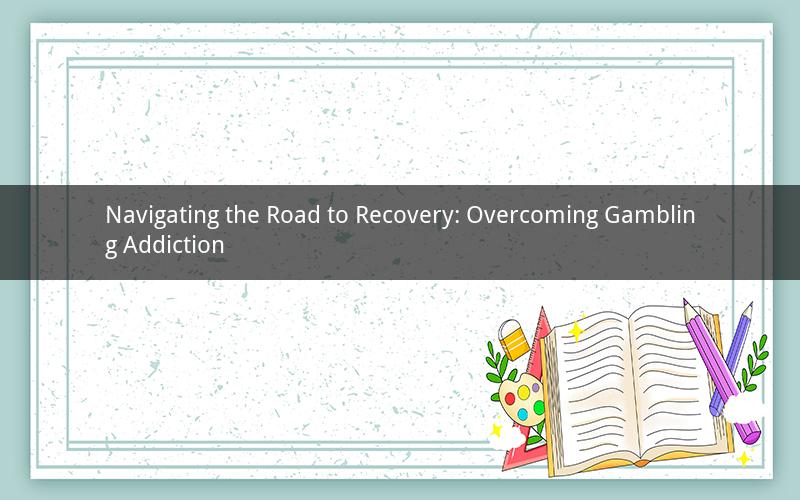
Introduction:
Gambling addiction is a complex issue that affects individuals, families, and society at large. It is a disorder characterized by the inability to control or stop gambling despite negative consequences. Recovery from gambling addiction is a challenging process that requires time, effort, and support. This article explores various strategies and resources available for individuals seeking to overcome this addiction.
1. Understanding Gambling Addiction
Gambling addiction, also known as pathological gambling, is a chronic condition that can lead to significant harm in various aspects of a person's life. It is crucial to recognize the signs and symptoms of gambling addiction to begin the recovery process.
Symptoms of Gambling Addiction:
- Continual desire to gamble, even when faced with negative consequences.
- Preoccupation with gambling, such as planning and thinking about it constantly.
- Inability to stop gambling despite promises to do so.
- Increased tolerance, requiring more money and time to achieve the same level of excitement.
- Risking more money than intended, or betting longer than planned.
- Engaging in illegal activities to fund gambling.
- Lying to hide the extent of gambling activities.
- Neglecting responsibilities, relationships, and personal health due to gambling.
2. Seeking Professional Help
Professional help is an essential component of gambling addiction recovery. Therapists, counselors, and addiction specialists can provide tailored support and guidance throughout the process.
Types of Treatment:
- Cognitive-behavioral therapy (CBT): Helps individuals identify and change negative thought patterns and behaviors associated with gambling.
- Dialectical behavior therapy (DBT): Focuses on emotional regulation and teaches coping skills to manage cravings and stress.
- Motivational interviewing: Encourages individuals to explore their reasons for seeking change and increases motivation for recovery.
- Group therapy: Provides a supportive environment where individuals can share experiences and learn from others facing similar challenges.
3. Building a Support System
A strong support system is crucial for overcoming gambling addiction. Family, friends, and support groups can offer emotional support, encouragement, and practical advice.
Support Groups:
- Gamblers Anonymous (GA): A fellowship of individuals who share their experience, strength, and hope with each other.
- Gam-Anon: Provides support for family members and friends of problem gamblers.
- SMART Recovery: Offers scientifically-based tools and techniques to help individuals achieve abstinence and develop healthy lifestyles.
4. Developing Coping Strategies
Coping strategies are essential for managing cravings and avoiding relapse. Identifying and implementing healthy alternatives to gambling can aid in the recovery process.
Coping Strategies:
- Engaging in hobbies and activities that provide enjoyment and fulfillment.
- Developing a routine and sticking to it to avoid boredom and the urge to gamble.
- Seeking out positive social interactions and support.
- Practicing relaxation techniques, such as meditation or deep breathing exercises, to manage stress.
- Establishing financial boundaries and seeking financial counseling if needed.
5. Long-Term Recovery
Recovery from gambling addiction is an ongoing process that requires commitment and persistence. It is crucial to maintain a focus on long-term recovery and continue to adapt strategies as needed.
Maintaining Recovery:
- Continuing to attend support group meetings and seek professional help as needed.
- Regularly practicing coping strategies and self-care activities.
- Surrounding oneself with a supportive and understanding network.
- Monitoring financial and emotional well-being to identify potential triggers for relapse.
6. Overcoming Challenges
Overcoming gambling addiction is not without its challenges. Individuals may face setbacks, relapses, and moments of doubt. It is important to acknowledge these challenges and learn from them, rather than becoming discouraged.
Challenges in Recovery:
- Dealing with cravings and the urge to gamble.
- Overcoming societal stigma associated with addiction.
- Coping with financial and legal consequences of gambling.
- Maintaining motivation and perseverance in the face of setbacks.
Conclusion:
Recovery from gambling addiction is a journey that requires dedication, support, and a willingness to change. By understanding the nature of the addiction, seeking professional help, building a support system, developing coping strategies, and maintaining a focus on long-term recovery, individuals can overcome this challenging disorder and regain control over their lives.
Questions and Answers:
1. Q: Can someone recover from gambling addiction on their own without professional help?
A: While some individuals may find success through self-help methods, seeking professional help from therapists, counselors, or addiction specialists is often recommended for a more comprehensive approach to recovery.
2. Q: How long does it take to recover from gambling addiction?
A: The duration of recovery varies for each individual. Some may experience immediate relief, while others may require years of commitment to maintain sobriety.
3. Q: Can a person ever fully recover from gambling addiction?
A: Recovery from gambling addiction is an ongoing process, and while individuals can achieve long-term sobriety, they must remain vigilant and continue to practice healthy coping strategies to prevent relapse.
4. Q: What can family and friends do to support someone struggling with gambling addiction?
A: Family and friends can offer emotional support, encourage participation in treatment programs, and create a supportive environment. They should also educate themselves about gambling addiction to better understand and assist their loved ones.
5. Q: Are there any alternative treatments for gambling addiction?
A: Apart from traditional treatment methods, some individuals may find success with alternative treatments such as art therapy, equine therapy, or yoga. It is important to consult with a professional to determine the most suitable approach for individual needs.